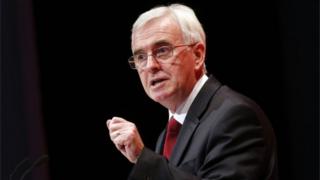 Image copyright
Image copyright
PA
John McDonnell said the delay was a “partial U-turn”
Labour has claimed the government is in disarray after Theresa May said controversial Budget tax rises would not go before MPs until the autumn.
Shadow chancellor John McDonnell said the announcement signalled a “partial U-turn” over increases in National Insurance for self-employed workers.
The prime minister insisted the rises were necessary and fair, but said the chancellor would listen to concerns.
The move was announced by Chancellor Philip Hammond in Wednesday’s Budget.
More than a dozen Conservative MPs have criticised the £2bn National Insurance hit, including Iain Duncan Smith, John Redwood, Anna Soubry and Dominic Raab.
Mr McDonnell said: “The fact the prime minister won’t fully support her own chancellor’s Budget measure, and has been forced by Labour to row back on it just 24 hours after he delivered his speech in Parliament, shows the level of disarray that exists at the top of government.”
Mrs May should “show some leadership, rather than this partial U-turn, and just scrap these tax rises for low and middle earners altogether”, he said.
What is National Insurance?
- National Insurance contributions go into a fund that pays for the state pension and some other benefits
- They also help pay for the NHS
- National Insurance is deducted automatically from employees’ salaries
- There are different classes of National Insurance payments, depending on people’s employment status and how much they earn
- The self-employed currently pay a lower rate than those in employment
- The government says this was traditionally down to a lesser entitlement to benefits and pensions, but that these disparities have mostly been removed, so the difference in rates is unfair
- But critics say it is justified because self-employed people are not entitled to things like paid holiday and sickness leave
Budget tax rise: What’s the fuss about?
The prime minister defended the plans for National Insurance, saying the measures would ensure the tax system was fair, narrowing the gap between what employed and self-employed people paid.
At a press conference at the EU summit in Brussels, Mrs May said: “People will be able to look at the government paper when we produce it, showing all our changes and take a judgment in the round.
“Of course the chancellor will be speaking – as will his ministers – to MPs, business people and others to listen to the concerns.
“But this is a change that leaves lower-paid self-employed workers better off, it’s accompanied by more rights and protections for self-employed workers and it reforms the system of National Insurance to make it simpler, to make it fairer and to make it more progressive.”
The Conservatives’ last general election manifesto explicitly ruled out rises in National Insurance, VAT and income tax during the lifetime of the current Parliament.
Wales Office minister Guto Bebb told BBC Radio Cymru: “I believe we should apologise.”
And Conservative Tom Tugendhat, who has expressed concerns about the policy, said he was “very pleased” the prime minister was taking time to consider its wider implications, saying the policy must “reflect the individual risks that individuals and self-employed people take”.
Liberal Democrat leader Tim Farron suggested the prime minister was worried about elections in May.
“Kicking the can down the road for a few weeks shows that the Conservatives are still planning to hit hard-working self-employed people, but that they haven’t the courage to say so this side of the local elections,” he said.
In the wake of Mr Hammond’s Budget announcement, ministers argued that legislation enshrining the manifesto commitment in law – approved by Parliament in 2015 – referred only to National Insurance contributions paid directly by employers and their employees.
Despite being announced in the Budget, MPs will not vote on the changes until the autumn because separate legislation is required.
Critics accused the prime minister of a deliberate delay so the government could soften the proposals and stave off a potential rebellion from Tory backbenchers who have expressed opposition.
Mrs May said the increase was necessary because of Britain’s changing workforce, and the timing would allow MPs to consider the measures in full.
A paper detailing the full effect of the changes will be published in the summer, followed by the results of a review into wider employment practices.
The change outlined in the Budget will see millions of self-employed workers pay an average of £240 a year more, but ministers say those earning £16,250 or less will see their NI contributions fall.
The change was supported by some economic commentators, who argue it takes account of the growth in the size of self-employment.
The Institute for Fiscal Studies suggested further rises were needed while the Resolution Foundation think tank called it “welcome and progressive”.
Its chair, the former Conservative MP Lord Willetts, told Radio 4’s Today the tax system was a “living, breathing thing that has to change as circumstances change”.
Budget 2017: ‘Disarray’ over National Insurance rises}

